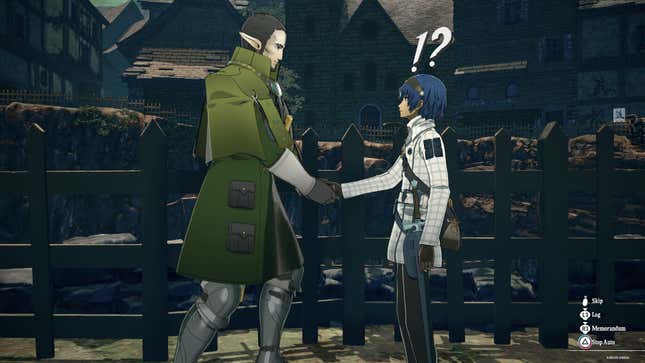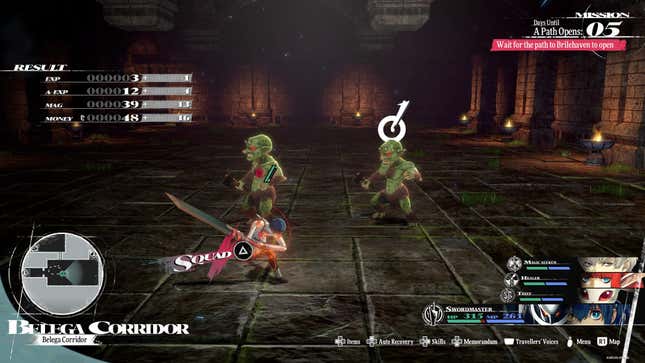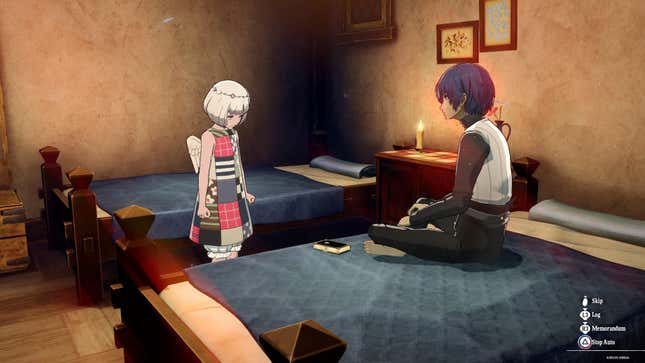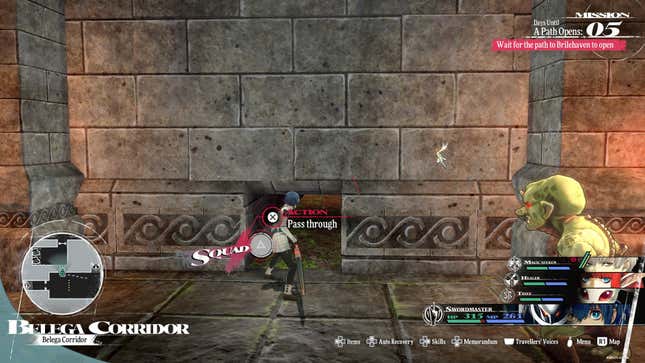Metaphor: ReFantazio, the new fantasy RPG from the minds behind Persona, is a pretty dense game. There are a lot of systems to keep track of, levels to grind, and time to manage as you travel through the world of Euchronia. It’s easy to get overwhelmed by all the things to do when actual in-game days pass when you so much as talk to someone.
A lot of this will be familiar to Persona fans, but if Metaphor’s fantasy setting has drawn you in or you’re a veteran looking for some tips on what’s different, we have a big round-up of helpful tips to keep in mind as you jump into Atlus’ 70+ hour epic. Here are X things to know before you start Metaphor: ReFantazio.
Stealth is pretty forgiving
One of the biggest changes in Metaphor from Persona is that you can attack enemies on the overworld like in an action game and kill them without switching to a turn-based battle. If you’re powerful enough to take an enemy out it will save you a lot of time grinding levels and exploring dungeons. However, sometimes you’ll encounter foes who you’ll still have to take out the old-fashioned way. But you can ambush them to start the battle with an advantage, and that means sneaking around them and striking from behind. The “stealth” in Metaphor is extremely forgiving. If you’re seen by an enemy, just sprint far enough away and they will forget you were there, then just stab them in the back when they turn around. You can even escape from a battle, run away, then you’ll get a second chance at stealth. – Kenneth Shepard
Listen to the narrated lore dumps on the map
Metaphor’s world is pretty elaborate, with centuries of culture and politics to learn about. One way the game weaves in its world-building is with its narrator, who tells you about towns and cities as you head to them on your runner ship. So while the transitional screens can be skipped, you should listen to or read the subtitles for the lore dumps as you head from one place to another. — KS
You get control of your teammates…eventually
One of the biggest shocks when I first started Metaphor was that I couldn’t control my teammates. This was a much-maligned part of Atlus’ previous games like Persona 3 that was changed in re-releases and remakes. But don’t panic, this is just a temporary thing-. You’ll fight alongside a few characters before you control them in battle, but you will at some point be able to issue commands and strategize. They just gate that behind the story for a few hours. — KS
Read the Mythical Scrolls in Akademia
Akademia is a safe space where you’re able to change up your Archetype classes, talk with the enigmatic bookkeeper More, and pet his cat Plateau. However, there’s also a scroll next to his desk that hints at some of the game’s biggest mysteries. The dialogue that follows will change throughout the game, so check in on it every now and then. — KS
If your protagonist falls in battle, it’s not game over…except in the overworld
One of the best quality-of-life changes in Metaphor is that if your protagonist falls in battle you don’t get an immediate game over, unlike previous Atlus games. This means you don’t have to spend most of your resources trying to make sure he survives things that might randomly knock him out with one hit. However, this does not apply if you aren’t in a turn-based battle yet. When you’re smacking around enemies in the overworld before a battle has been initiated, they will smack right back. If they’re not powerful enough to initiate a battle with those attacks, you’ll still take damage, and if your HP hits zero while in the overworld, that’s a game over. — KS
Don’t forget you can reset battles if you get a bad start
Metaphor encourages you to experiment. One of the ways it lets you do that is that you can reset a battle at any point as long as it’s your turn and you’ve got at least one character alive. Just press down the left analog stick and it will take you back to the very first turn of the fight. Keep in mind that if your opponent managed to start the battle with an advantage, they will still have it when you start the battle over. If you’re looking to get a full reset in which you can try and ambush an enemy, you’ll have to escape the battle and attack them in the overworld again. — KS

A lot of quality-of-life features are locked behind bonds
There are a lot of reasons to get to know the many characters you’ll meet in Metaphor: ReFantazio. There are, of course, the great stories and relationships you’ll uncover while hanging out with your new friends, but each also has some unlocks as you progress the relationship, such as new Archetypes to play as. Some, however, have quality-of-life features that really feel like they should be in the game by default. One example is More, who unlocks the ability to change your Archetypes in your pause menu, rather than having to go to Akademia. So just be aware that there are some perks to meeting up with your friends, even if they should probably just be available to you by default. — KS
Skating on your sword is the best way to get around
You spend a lot of time walking in Metaphor, but if you’re not in a dungeon or indoors, you can also skate on your magical sword. It’s a speed boost, looks fun as shit, and is generally the best way to get around as you travel through Euchronia. You’ll save yourself a lot of time if you get off your feet and onto your sword. — KS
Check your local stores for MP items
Metaphor is an Atlus game, and that means that MP is a scarce resource. Before you go into any dungeon or big story moment, check your local stores for items that will replenish this so you can use spells and abilities in fights. Some of these are only sold in limited quantities, so look for accessories that can give you even the smallest bit of MP. Otherwise, you’ll probably end up having to leave a dungeon early and come back to it later. So mitigate this as much as you can. — KS
Don’t rely on the same Archetypes the whole game
When you’ve found classes that work for your team, it’s easy to get comfortable using the same Archetypes through much of Metaphor. However, you will need to level up other trees to progress even the base Archetype for each character. So give some love to the other ancillary classes along the way. It will give you a new appreciation for the intricacies of Metaphor’s battle system, give you abilities you can “inherit” for the classes you do use, and let you further master the Archetypes you’re already using. — KS
If you can beat an enemy without getting hit, you’ll get bonuses
There are a lot of ways to maximize your grind in Metaphore. If you manage to take out a group of enemies without getting hit in a turn-based fight, you’ll get an “Unscathed Triumph” bonus to your experience, money, and magla when you’re done. So beat enemies quickly both because you should aim to overpower your foes, but because you’ll also fill your pockets and get stronger because of it. — KS
Pull up the Memorandum at pretty much any time
Taking a page from Final Fantasy XVI, Metaphor: ReFantazio lets you open up its codex called the Memorandum during most cutscenes. Someone said a proper noun you don’t recognize? Push down the right thumbstick at any time and you can scroll through the codex and brush up on your knowledge. — KS
Some follower conversations are only available on the runner
Throughout Metaphor, you’ll get pinged when your followers want to talk to you. However, even if someone wants to talk to you, that doesn’t mean they will at the moment. Some of these conversations can only take place on your ship, which only moves when you’re en route to a new location. So if you have someone who wants to chat but is being particular about where and when, head to the runner and map out a place to go. Sometimes you’ll even find someone who wants to talk but hasn’t made you aware of it until you start heading somewhere. I missed a new follower bond for several in-game days before realizing that I had to initiate it on the ship. So check in with folks while you’re in transit, as well. — KS

Check the pantry and use the washroom every day on the runner
Another thing to do whenever you’re on the runner is check the pantry and use the washroom. Both of these actions have some benefits, and they won’t take up your travel day. Every time you check the pantry you’ll find some new ingredients to cook with, and the washroom will give you an extra 100 experience each time you use it, which isn’t a lot, but it’s free. You can only do these once a day, but they do refresh multiple times over the course of a days-long trip. So check them both every morning when you wake up on the runner. — KS
Talk to informants before going into dungeons
In almost every town you’ll be able to buy intel from informants. These can give you an edge on big bosses as they’ll let you know things like elemental weaknesses and other strategies. They do cost money, but they’re rarely enough to break the bank. So if someone mentions that an informant might have some helpful intel for you, don’t pass it up. — KS
Bad weather can offer a greater challenge but extra rewards
One thingto keep in mind before you go into a dungeon is that the weather will have a tangible effect on how difficult fights are. Bad weather can fundamentally change your battle strategy, as it will prevent you from getting additional turns when you exploit an enemy weakness, which is typically a key part of your tactics in combat. The trade-off is that you’ll get more rewards for finishing battles. So be mindful of this as you head out on missions. You can talk to a fortune teller in town to tell you what the weather will be like, but you will also meet a character later in the game who can outright change the weather for you. – KS
Agility is secretly the most important stat in the game
You’ll upgrade a lot of stats over the course of Metaphor, but agility/evasion is secretly the most important one. Sure, making your characters a bit more nimble when they need to dodge is standard practice, but dodging attacks is essential in Metaphor because of how it factors into the game’s turn system. Metaphor fights play out in rounds with the player’s team and the enemy team executing a number of actions before it swaps to the opposing side. Managing how many turns you have left is a major part of battles, but finding ways to deny your opponent their own turns is one of the best ways to get the upper hand. If you miss an attack, you’ll lose two turns as opposed to just one, so having characters who can dodge attacks more frequently is one of the easiest ways to end an opponent’s turn and mitigate additional damage, healing, or buffs on their part. — KS
In the late game, keep your characters on mastered Archetypes to help with the grind
As you level up Archetypes, you’ll eventually reach Rank 20, which is considered “mastered,” and can no longer level up. However, you will still receive experience points for your Archetype, you’ll just get an item that can be used to level up other Archetypes each time you hit the end of Rank. One of the most effective ways I was able to level up Archetypes I hadn’t been using all game was not to use those classes I was trying to level up, but to instead farm these items by leveling up the Archetypes I’d already mastered. By the end game, leveling up the classes I needed to in order to unlock some of the later Archetypes became trivial because I just fed them these items. That way I didn’t have to compromise the strategies I’d already mastered just to level up something I wasn’t going to keep using in the long run. — KS

Lock on to enemies to execute a dash attack in the overworld combat
Metaphor: ReFantazio mixes real-time combat and turn-based battles, but the action side of that equation is admittedly basic. You have an attack button to chain strikes together, a dodge roll, and…that’s about it. That said, it’s easy to forget that your protagonist can execute a pretty fancy dash attack by locking onto a faraway enemy and pressing the attack button. This will almost immediately close the distance between you and your foe, which should help you score a hit or two before the enemy can retaliate.
This maneuver works with any short-range weapon your protagonist has equipped, so even Mages can charge into a crowd of foes and (hopefully) take care of them all with a few spells. —Timothy Monbleau
Your main character’s Archetype grants a unique passive skill
The classes in Metaphor—called Archetypes in-game—generally feature all the same stat bonuses and spells no matter which party member has them equipped. However, the main character’s Archetype will completely change the way he plays in overworld combat. Each weapon will alter the speed and range of your attacks, and some Archetypes even allow you to snipe enemies from afar.
Additionally, each Archetype will grant the main character an extra perk that will help out during the real-time combat sections. For example, while the Warrior’s huge greatsword has an exceptionally slow swing, the Barge Past passive will prevent enemies from beginning turn-based battles with an advantage. Other Archetypes can benefit your entire party too, such as the Gunner who can heal your party after stunning or defeating enemies in the overworld. — TM
Use the Mage Archetype in dungeons to refill your party’s MP in dungeons
We need to highlight the amazing passive skill the Mage Archetype grants the main character. In short, whenever your main character stuns or defeats enemies in overworld combat as a Mage, your party will heal a small amount of MP. It’s not a lot (usually a couple MP per enemy), but MP recovery in Metaphor is very rare. You’ll find a handful of MP recovery items in the early game, but that stack will deplete quickly unless you’re really optimizing your magic consumption
Basic enemies can and will respawn in any dungeons that feature multiple “zones” to explore. In other words, it’s usually easy to slap the Mage Archetype on your protagonist and slay a bunch of small fry until your party’s magic reserves are fully topped off. If you don’t want to consume multiple in-game days just to get through a single dungeon, this trick will come in clutch. — TM
Save your purchases for Idlesday or the 29th of the month
Metaphor carries over several gameplay mechanics that are synonymous with the Persona series, which even extends to the smaller details of Atlus’ flagship social simulator. Just as you could purchase discounted weapons in Persona 3 Reload on Saturdays, “Idlesday” is when almost every shop will discount their goods by 20 percent. All shops throwing sales on Idlesday will appear as red icons on your map.
Similarly, the 29th of every month in Metaphor will unlock 30 percent discounts at weapon and armor stores. These are harder to plan around than the Idlesday sales, especially if you’re staring down a quest that needs to be completed within a handful of days. That said, several shops feature extra powerful weapons and armor that cost a huge chunk of change to buy, so waiting for a discount can easily save you north of 10,000 money on those bigger purchases.
If you forget which days are your big sale days, the “Calendar” option on your main menu will specifically list these sales. — TM
Build your party around Synthesis skills
I touched on this when I explained which Archetypes are best in Metaphor, but this is a point that bears repeating. Synthesis skills in Metaphor are your Chrono Trigger-style Double Techs and Triple Techs, in which an Archetype can team up with certain combinations of party members to execute special attacks at the cost of multiple turn icons. These can be hard to take advantage of, since going all-in on a Synergy skill can be less optimal than letting two characters attack individually.
However, when utilized correctly, Synergy skills can turn the tide of battle overwhelmingly in your favor. In the early game, magic users can only use party-wide attack magic via Synergy skills, which you’ll really want for normal encounters and boss fights alike. Later on, you’ll unlock Synergy skills that can grant huge party buffs or exploit weaknesses that your Archetypes can’t normally take advantage of. Realistically, you probably won’t construct a party in which every character can use every Synergy skill they can. But if you see a Synergy skill that catches your eye, it’s definitely worth the effort to build a team that can specifically use it. — TM

Use your time to advance follower relationships and complete quests
As anyone who has completed an optimized run of a Persona game knows, time is your most valuable resource. Metaphor similarly advances its plot based on the passage of in-game time, and many side quests have rigid deadlines that can pass you by. You’re not obligated to see every corner of Metaphor before you reach the end credits, but if you want to get the most out of your new $70 video game, you probably don’t want to miss anything just because you were careless.
In addition to the aforementioned quests, it’s best to use your afternoons and evenings on pursuits that absolutely require in-game time. Advancing your relationships with your Followers should be a major priority, since every increased rank of their relationships will strengthen your Archetypes and potentially unlock wildly useful perks. Similarly, you can use spare time to increase Royal Virtues that you need to access new quests or gameplay features (such as the option to purify equipment at the cathedral). Meanwhile, using time on activities that increase battle stats like MP is relatively wasteful since you can always level grind for “free” to increase these attributes. — TM
Don’t bother cooking until you unlock the Speed Cooking ability
Cooking in fantasy worlds is all the rage these days, and Metaphor is no exception. You’ll eventually unlock the ability to freely cook up recipes with your party members, but whatever you do, do not waste your time cooking right away. On the subject of helpful Follower perks, Maria is one of the first Followers you unlock. By increasing her Follower rank, you’ll unlock the ability “Speed Cooking,” which allows you to cook without consuming any time. This is a huge upgrade!
Granted, Speed Cooking does have its own limitations. You’re still stuck with preparing one dish before you need to find some other activity to pass the time. Still, if you’re looking to cook every dish in the game, this is the way to do it. — TM
The autosave in dungeons is generous
Look, I’m not going to say that you should save scum your way through Metaphor. That said, even though you can’t save anywhere in dungeons, your game will update your autosave file frequently. For instance, finding treasure chests seems to consistently trigger an autosave.
I mention this because, occasionally, Metaphor just does not go your way. If an enemy ambushes you, you could find yourself needing to dig deep into your reserve of items and magic just to make it out alive. If you’re really on the back foot, loading your autosave file that’s five minutes old might be more advantageous than forfeiting a ton of resources. — TM

Look out for hidden passages in dungeons
Metaphor isn’t afraid to lean on some classic RPG tropes, and that’s especially true when it comes to its dungeon design. Throughout your adventures—though most specifically in side quest dungeons—you’ll come across rooms hiding hidden treasures with seemingly no entrance. Doors to these rooms won’t have any prompt to use a key, and any stairways you find just don’t lead into these spaces. In situations like these, you most likely need to look for a hole in the wall that you can crawl through. These can be easy to miss since they can look pretty small, but your protagonist is apparently comfortable walking through tight spaces.
As you might expect, these passageways will not show up on your map until you’ve crawled through them yourself. So if you see a room that you just can’t find a way inside of, check around the perimeter of it and see if there are any spots on your map that look like possible secret entrances. — TM
Don’t worry, you can fast travel between cities for free
With all there is to see and do in Metaphor, you might feel stressed trying to cram in all your objectives in a city before the story whisks you away somewhere else. After all, there are expensive things to buy and Followers to get to know better. You can drive yourself crazy trying to fit all that into a dozen in-game days!
Fortunately, soon after you progress to the game’s second major hub area, you’ll unlock the ability to freely travel between cities. That’s right, there’s no time cost associated with fast traveling like this, and you can freely engage in any time-consuming activities during the afternoon or evening while you’re away. To be clear, this does not totally alleviate the stress of trying to do everything you can within the constraints of the in-game calendar. But at the very least, it helps. — TM




